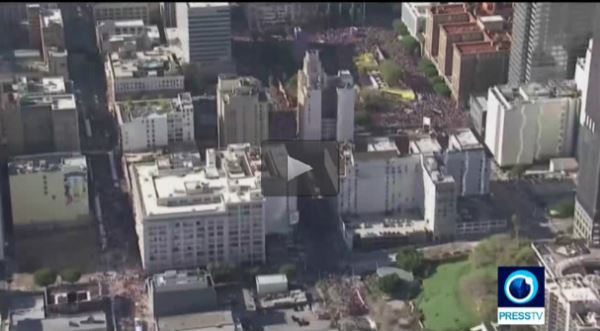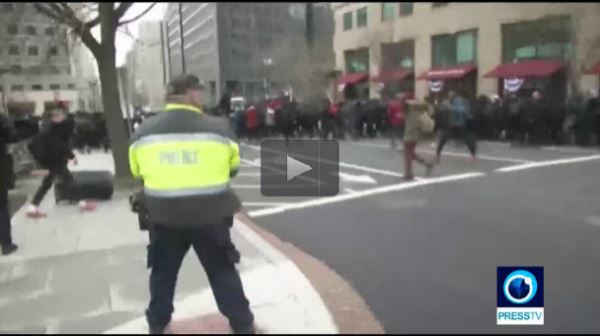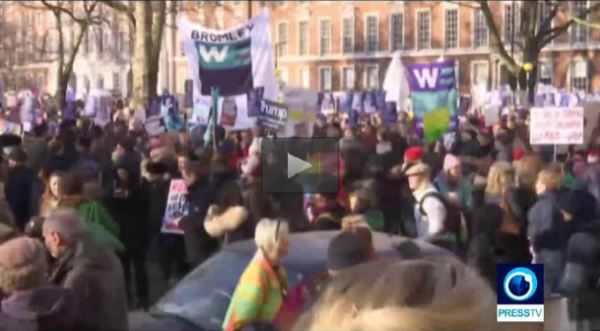 Hundreds of thousands of people from across the United States descend on Washington to voice their anger and anxiety over Donald Trump’s presidency a day after he took the oath of office.
Hundreds of thousands of people from across the United States descend on Washington to voice their anger and anxiety over Donald Trump’s presidency a day after he took the oath of office.
The Women’s March on Washington, which organizers said attracted half a million people on Saturday, seeks to raise awareness of women’s rights and other civil rights, that many Americans fear could be under threat by the new president.
The city’s subway reported 275,000 travels by 11 am, compared to 193,000 trips made on inauguration day.

Trump angered many at home and abroad by repeatedly making disparaging remarks about women, Muslims and immigrants during his bombastic presidential campaign.
The Women’s March, which began with a Facebook call by a Hawaiian grandmother in the aftermath of Trump’s election victory in November, is predicted to become one of the largest political demonstrations ever seen in the US capital.
 People pack the streets near the National Mall for the start of the Women’s March in Washington, January 21, 2017. (Photo by Reuters)
People pack the streets near the National Mall for the start of the Women’s March in Washington, January 21, 2017. (Photo by Reuters) Former US Secretary of State John Kerry walks to join the Women’s March on Washington, after the inauguration of President Donald Trump, January 21, 2017. (Photo by Reuters)
Former US Secretary of State John Kerry walks to join the Women’s March on Washington, after the inauguration of President Donald Trump, January 21, 2017. (Photo by Reuters)Organizers said demonstrators were going to Washington on their own, using buses and trains from distant locations.
“We will witness one of the largest and most significant demonstrations for social justice in America’s 240-year history,” said Crystal Hoyt, an associate dean at the University of Richmond.
“By stoking and exploiting fear, Trump mobilized deep-seated sexism, racism, and xenophobia to gain political traction,” she added.
The march comes the day after Washington was rocked by violent protest against Trump, highlighting the depth of frustration in a deeply divided country unseen in decades.

While the march has been organized in response to Trump’s presidency, some marchers said they did not mean to attack him personally.
“I wouldn’t call it an anti-Trump march, I would call it a ‘We are watching you, Trump’ kind of march,” said Ayesha Ahmed, who came from Chicago with the Muslim Women’s Alliance, according to NBC News.
Many of the protesters said they had not been politically active in the past, but the divisive nature of the 2016 election awakened their civic duties.
Mary Hornig, a grandmother who came from Virginia with three family members, said she participated in the march “for the future. Now and the future.”
She acknowledged that Trump might not listen to their message, but added, “I’m hoping some of the other Republicans might.”

“We have put this man in the office who is a terrible role model, teaching people that bullies are acceptable and women are property,” said protester Kelly Hansen, 32, who traveled to Washington from Boston.
“It’s completely unacceptable,” she added. “It’s setting us back 50 years.”
Trump defeated his Democrat rival, Hillary Clinton, on November 8 and took to the oval office on Friday.
 Protesters take part in the Women’s March on London, on January 21, 2017. (Photo by Reuters)
Protesters take part in the Women’s March on London, on January 21, 2017. (Photo by Reuters)Alongside with the Women’s March on Washington, more than 600 “sister marches” have been planned around the United States. Some of the largest rallies were held in Boston, New York, Chicago and Los Angeles.
Law enforcement authorities will be on alert for any new flare-up of violence.
Anti-Trump protests sweep world

Thousands of people are also marching through the British capital, London, to show solidarity with those who are gathering for the main march in Washington.
Demonstrators were marching from the US embassy in London’s Grosvenor Square, to Trafalgar Square on Saturday.
Similar protests are also taking place across the UK in Belfast, Cardiff, Edinburgh, Lancaster, Leeds, Liverpool, Manchester, Bristol and Shipley.
 Demonstrators protest against U.S. President Donald Trump next to the US embassy during the Women’s March in Lisbon, Portugal January 21, 2017. (Photo by Reuters)
Demonstrators protest against U.S. President Donald Trump next to the US embassy during the Women’s March in Lisbon, Portugal January 21, 2017. (Photo by Reuters) Anti-Trump protesters are preparing to march on board an expedition ship in the Antarctic on January 21, 2017.
Anti-Trump protesters are preparing to march on board an expedition ship in the Antarctic on January 21, 2017.At least 700 sister marches were planned around the world on Saturday. Women in more than 30 other countries took to the streets to march against Trump.
Rallies have already taken place in Paris, London, Berlin, Amsterdam, Mexico City, Bangkok, Delhi, Cape Town, Tokyo and other cities across the world in solidarity with Washington marchers.
#WomensMarch takes to the streets around the world Live updates
Thousands of women are marching in cities around world to call for the protection of civil liberties and diverse cultures which organizers say have been threatened by the recent US presidential election.
The day of action centers around the Women’s March which has been organised near US Capitol buildings, Washington, on Donald Trump’s first full day in the White House.
So far, sister rallies have taken place in Japan, Australia while demonstrations are also happening in European cities like London, Paris, Barcelona, Dublin and Milan.
22 January 2017
00:21 GMT
“Penguins for Peace” march was even held by the women who are stationed at US research center in Antarctica.
00:17 GMTMore than half a million people attended the anti-Trump march in LA, according to police estimates. The city’s Mayor, Eric Garcetti, thanked participants for a“show of unity, peace & strength.”
22:27 GMTThousands of protesters surround Trump Tower in NYC.
21:53 GMTAround 10,000 people attended the march in Vancouver, according to the city’s police estimates.
21:22 GMTBetween 135,000-150,000 people attended the march in Boston, according to estimates from the city Mayor’s office, while organizers expected around 80,000. Boston’s Mayor Marty Walsh said protesters can “always count on him as an ally.”
20:33 GMTThe large crowds at the Women’s March in Chicago forced organizers to cancel their initial plans to march downtown. Instead, they opted to extend the ongoing rally in Grant Park along Lake Michigan, by using overflow areas, as reported by AP.
20:20 GMTThe massive turnout at the Women’s March in Washington, DC, prevented organizers from leading the main and formal march toward the White House, as the entire planned route was filled with hundreds of thousands of ‘sister’ protesters, AP reports, citing an unnamed DC official. The official said more than half a million people could have been protesting on the streets of Washington, DC.